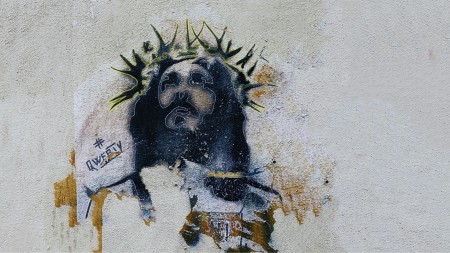The existence of God: Jesus a historical figure? (part 2)

As hard as this might be to believe, there are some people convinced that Jesus was not a man of history but some type of mythical figure. They claim the Resurrection story was based on ancient myths of religious figures who rose from the dead. These mythological stories were written many years before the Christian myth was written.
However, there are no credible historical scholars who make this claim.
In the wonderful bookThe Story of Reality, Greg Koukl confronts this issue head on. He has read extensively from the trained historians who have gone back to the earliest records of these ancient accounts. Here is what those historians have discovered.
- A close look at the primary sources shows two things that are startling given the popularity of this view. First, the myths that actually pre-date Jesus’ time bear virtually no resemblance to the particular details of Jesus’ life. A host of alleged similarities turn out to be nonexistent. Whatever parallels remain are usually far too general to be significant.
- According to historian Tryggve Mettinger, the scholar who has done the most recent exhaustive study of this question, there simply is “no prima facie” evidence that the death and Resurrection of Jesus is a mythological construct, drawing on the myths and rites of the dying and rising gods of the surrounding world.
- Second, mythical accounts of the mystery-religion gods that actually do bear some resemblance to Jesus’ life unfortunately (for the theory) show up after his time. This fact creates a problem for the recycled redeemer view since it looks very much like those stories were copied from the Gospels, not the other way around. Clearly, the child cannot come before the parent. The “recycled” version must appear in the historical record after the one it allegedly came from, not before it.
It is also important to recognize the number of ancient historians, who lived during the time of Christ, and wrote of Him.

Historian Gary Habermas details a total of thirty-nine ancient sources documenting the life of Christ. Some of these were Christian historians, but many of them were not. To put this into perspective, there are only nine ancient sources that mention Tiberius Caesar. Only nine. Here we find an emperor of Rome who ruled for twenty-two years, yet there are only nine ancient sources that mention him while there are thirty-nine sources that speak of Jesus. Of these thirty-nine, several mention Jesus in just a paragraph or two while others write of him extensively.
These include Cornelius Tacitus, considered the greatest historian of the Roman Empire who was born in 57 A.D., and Justin Martyr, who lived from 65 A.D. to 110 A.D. and wrote extensively of Jesus. Then you have Flavius Josephus, touted as the greatest Jewish historian of antiquity and who wrote about the life of Christ. He was born in 37 A.D., just after Jesus’ death.
So abundant is the testimony pointing to Christ’s historical existence that Dr. F.F. Bruce, professor of biblical criticism at the University of Manchester in England, suggests that reputable historians could not possibly propagate this theory.
“Some writers may toy with the fancy of a ‘Christ myth,’ but they do not do so on the ground of historical evidence. The historicity of Christ is as axiomatic for an unbiased historian as the historicity of Julius Caesar.”
Scott Appleby, a professor of Church History at Notre Dame, concurs:
“There’s no ‘real doubt’ that Jesus existed,” he said. “What Jesus of Nazareth did and what he means is a different question. But on the question of the existence, there is more evidence of the existence of Jesus of Nazareth than there would be for many other historical people who actually existed.
Not only did Jesus actually exist, but he actually had some kind of prominence to be mentioned in two or three chronicles."
What I also find interesting is the number of religious skeptics who clearly are convinced that Jesus was a legitimate historical figure.
Will Durant, the Pulitzer Prize-winning historian who wrote the most successful work of history, the eleven-volume The Story of Civilization, concludes his material on Christ this way:
“No one reading these scenes can doubt the reality of the figure behind them…”
The skeptic and famed Irish historian W.E.H. Lecky says this:
“The character of Jesus has not only been the highest pattern of virtue, but the strongest incentive in its practice, and has exerted so deep an influence, that it may be truly said that the simple record of three short years of active life has done more to regenerate and to soften mankind than all the disquisitions of philosophers and all the exhortations of moralists.”
Most significantly, from Mark Clark’s The Problem of God: Answering a Skeptic’s Challenges to Christianity listen to the words of the great historian H.G. Wells:
“I am a historian, I am not a believer, but I must confess as a historian that this penniless preacher from Nazareth is irrevocably the very center of history. Jesus Christ is easily the most dominant figure in all history.”
Finally, this last point needs to be given strong consideration. Today the world’s calendars are built around the birth of Christ. History is divided into events that took place before His birth and those that took place after His birth. This is clearly an indication of the extent to which Western culture was shaped by this man Jesus. It is quite obvious that something of universal importance began with the historical figure of Jesus. Truly, no one could have possibly invented the person of Christ.
I close with this question posed by Jesus himself in Matthew 16:15, “But who do you say that I am?”
This article, Part 2 of my 3-part series, is an essay from my newest book Reflections on the Existence of God. The book lays out, in short essays, much of the evidence for the existence of God that is available. We should seek to take the evidence offered and use it to make reasonable conclusions. What you will find is, as the evidence accumulates, it enables us to come to confident conclusions about God. Who He is. And, that He truly is.
Richard E. Simmons III is a Christian author, speaker, and the Executive Director of The Center for Executive Leadership, a non-profit, faith-based ministry in Birmingham, Alabama. His best-selling titles include The True Measure of a Man, The Power of a Humble Life, Wisdom: Life's Great Treasure, and his newest book, Reflections on the Existence of God. Follow Richard on Facebook, Instagram, and LinkedIn @thecenterbham. Tune in to Richard's Reliable Truth Podcast on your favorite podcast app.
Get your copy of Reflections on the Existence of God on Amazon or at reflectionsontheexistenceofgod.com. Preview Chapter 1 for free here!





















